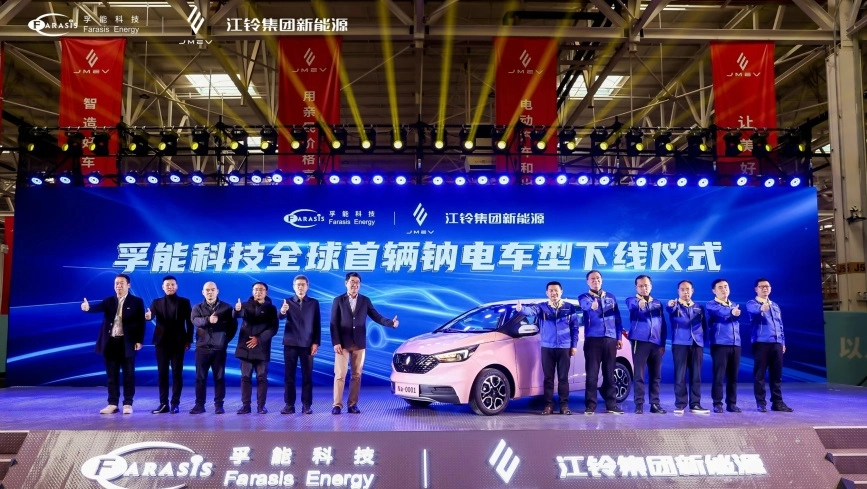The Chinese electric vehicle (EV) sector enters a transformative phase with the introduction of sodium-ion batteries, signaling a significant shift in battery technology.
On December 28, a ceremony at the JMEV electric vehicle plant in Nanchang, Jiangxi Province, celebrated the launch of the world’s first electric vehicle powered by Farasis Energy’s sodium-ion batteries.
The JMEV EV3 (Youth Edition) sets a new standard as the world’s first Class A00 electric vehicle equipped with this groundbreaking battery technology.
With a range of 251 kilometers, this model caters to the dynamic needs of younger drivers, covering daily commutes and citywide travel.
Farasis Energy’s sodium-ion battery stands out for its combination of layered oxides and hard carbon, showcasing impressive benchmarks in the electric vehicle battery space:
- Energy Density: 140 to 160 Wh/kg;
- Safety: Battery cells have undergone extensive testing, successfully passing multiple tests, including puncture, overcharge, over-discharge, extrusion, and immersion. The battery pack meets the no thermal runaway standard.
- Low-Temperature Performance: The battery retains over 91% discharge capacity at -20°C (-4°F);
- Cycle Life: Extended lifespan meets the requirements of passenger electric vehicles and two-wheelers;
- Chemical Materials: Beyond layered oxides, Farasis Energy is also advancing the development of other premium materials, such as Prussian blue analogs and polyanionic compounds.
Farasis Energy is gearing up for the next leap in battery technology and anticipates the launch of its second-generation sodium-ion batteries in 2024.
These are expected to have an energy density of 160-180 Wh/kg, with plans to increase to 180-200 Wh/kg by 2026, targeting a broader range of use cases.
To further expand the adoption of its sodium-ion battery products, Farasis Energy is forming partnerships across multiple segments, including Class A00 micro-electric vehicles, two-wheeled electric vehicles, battery exchange services, and ESS.
The company has received positive responses from customers who received and tested its battery prototypes.
As mass production of sodium-ion batteries begins, Farasis Energy is strategically positioned to diversify its product portfolio, catering to various market needs.
This positions the company for continued success in acquiring customers both domestically and internationally.
With excellent low-temperature performance, sodium-ion batteries effectively address the range challenge faced by electric vehicles in colder climates.
Furthermore, safety and affordability ensure the provision of options applicable to a broader spectrum of scenarios, enhancing the user experience.
These features make the innovative battery solution a key complement to lithium battery systems in a range of cost-sensitive and safety-critical areas, including residential, industrial, and commercial energy storage.






